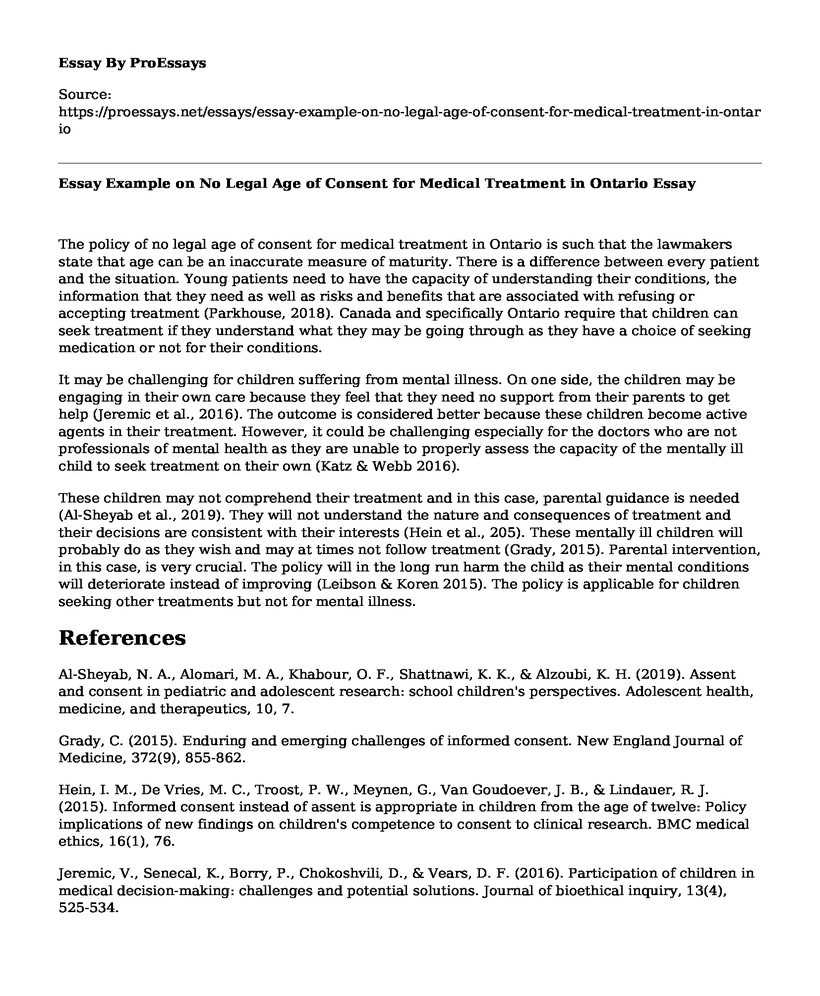The policy of no legal age of consent for medical treatment in Ontario is such that the lawmakers state that age can be an inaccurate measure of maturity. There is a difference between every patient and the situation. Young patients need to have the capacity of understanding their conditions, the information that they need as well as risks and benefits that are associated with refusing or accepting treatment (Parkhouse, 2018). Canada and specifically Ontario require that children can seek treatment if they understand what they may be going through as they have a choice of seeking medication or not for their conditions.
It may be challenging for children suffering from mental illness. On one side, the children may be engaging in their own care because they feel that they need no support from their parents to get help (Jeremic et al., 2016). The outcome is considered better because these children become active agents in their treatment. However, it could be challenging especially for the doctors who are not professionals of mental health as they are unable to properly assess the capacity of the mentally ill child to seek treatment on their own (Katz & Webb 2016).
These children may not comprehend their treatment and in this case, parental guidance is needed (Al-Sheyab et al., 2019). They will not understand the nature and consequences of treatment and their decisions are consistent with their interests (Hein et al., 205). These mentally ill children will probably do as they wish and may at times not follow treatment (Grady, 2015). Parental intervention, in this case, is very crucial. The policy will in the long run harm the child as their mental conditions will deteriorate instead of improving (Leibson & Koren 2015). The policy is applicable for children seeking other treatments but not for mental illness.
References
Al-Sheyab, N. A., Alomari, M. A., Khabour, O. F., Shattnawi, K. K., & Alzoubi, K. H. (2019). Assent and consent in pediatric and adolescent research: school children's perspectives. Adolescent health, medicine, and therapeutics, 10, 7.
Grady, C. (2015). Enduring and emerging challenges of informed consent. New England Journal of Medicine, 372(9), 855-862.
Hein, I. M., De Vries, M. C., Troost, P. W., Meynen, G., Van Goudoever, J. B., & Lindauer, R. J. (2015). Informed consent instead of assent is appropriate in children from the age of twelve: Policy implications of new findings on children's competence to consent to clinical research. BMC medical ethics, 16(1), 76.
Jeremic, V., Senecal, K., Borry, P., Chokoshvili, D., & Vears, D. F. (2016). Participation of children in medical decision-making: challenges and potential solutions. Journal of bioethical inquiry, 13(4), 525-534.
Katz, A. L., Webb, S. A., & Committee on Bioethics. (2016). Informed consent in decision-making in pediatric practice. Pediatrics, 138(2), e20161485.
Leibson, T., & Koren, G. (2015). Informed consent in pediatric research. Pediatric Drugs, 17(1), 5-11.
Parkhouse, J. (2018). Children and consent: the key issues: Part II. British Journal of Neuroscience Nursing, 14(2), 91-94.
Cite this page
Essay Example on No Legal Age of Consent for Medical Treatment in Ontario. (2023, Jan 16). Retrieved from https://proessays.net/essays/essay-example-on-no-legal-age-of-consent-for-medical-treatment-in-ontario
If you are the original author of this essay and no longer wish to have it published on the ProEssays website, please click below to request its removal:
- Research Proposal on Quality Care in Hospice Setting
- Compare and Contrast Essay on Christianity and Shintoism Approach Towards Healthcare
- Disease Prevention and Health Promotion Newsletter Paper Example
- Research Proposal on Teen Mothers' Social & Economic Experiences in Low-Income Areas
- Angiotensin II: Increasing Blood Pressure & Fluid Retention - Essay Sample
- Essay Example on Afraid to Die: HIV/AIDS Reality in South Carolina
- Paper Sample on Develop Real Estate: Set Goals, Strategies, and Vision







